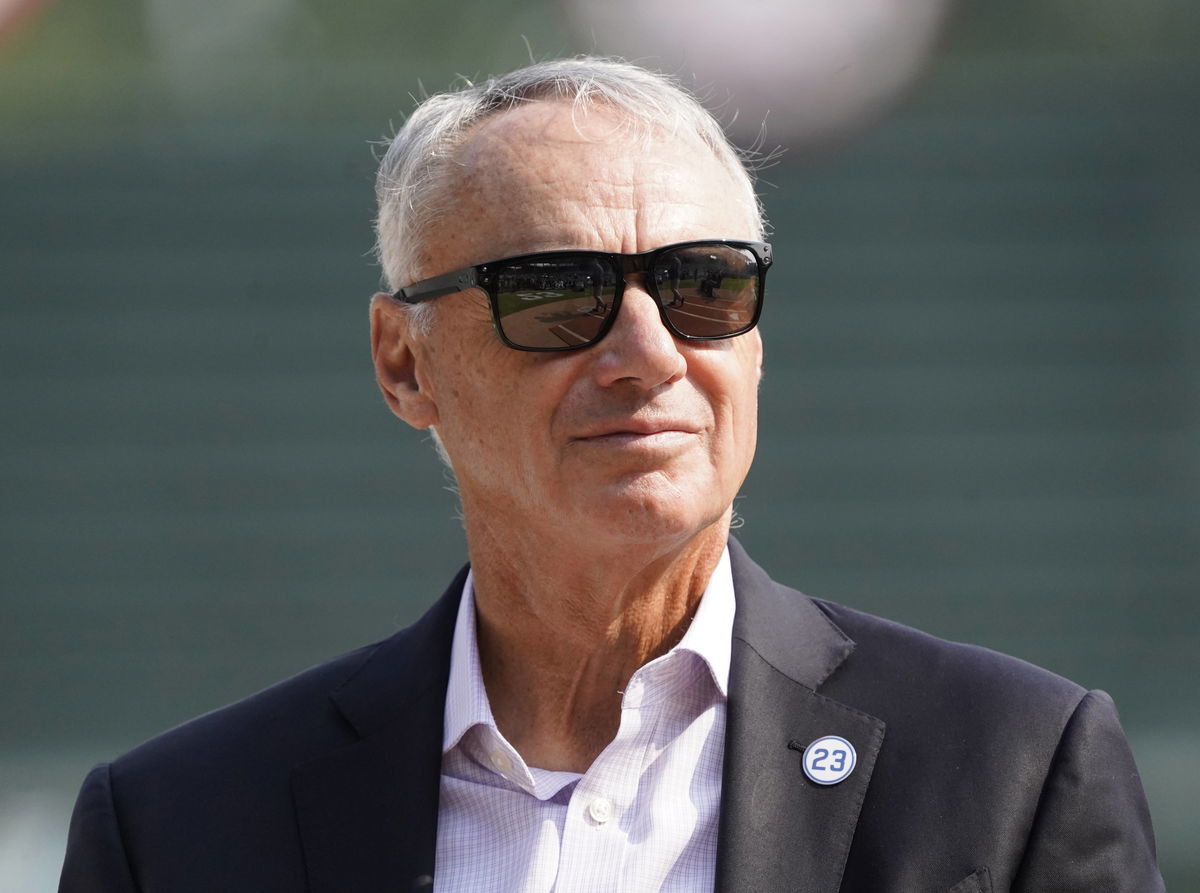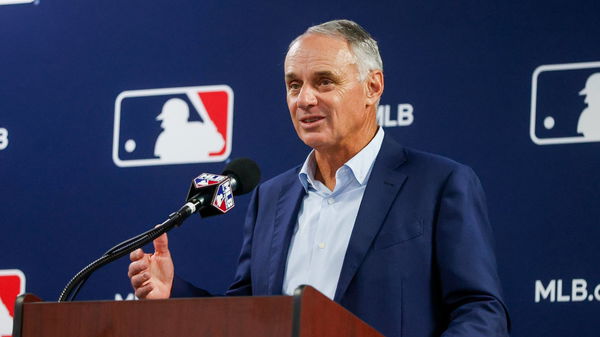
Imago
MLB, Baseball Herren, USA Chicago Cubs press conference, PK, Pressekonferenz Aug 1, 2025 Chicago, IL, USA Baseball Commissioner Rob Manfred announces Major League Baseball and the Chicago Cubs will host the 2027 All Star game at Wrigley Field. Chicago Wrigley Field IL USA, EDITORIAL USE ONLY PUBLICATIONxINxGERxSUIxAUTxONLY Copyright: xDavidxBanksx 20250802_cec_bb6_001

Imago
MLB, Baseball Herren, USA Chicago Cubs press conference, PK, Pressekonferenz Aug 1, 2025 Chicago, IL, USA Baseball Commissioner Rob Manfred announces Major League Baseball and the Chicago Cubs will host the 2027 All Star game at Wrigley Field. Chicago Wrigley Field IL USA, EDITORIAL USE ONLY PUBLICATIONxINxGERxSUIxAUTxONLY Copyright: xDavidxBanksx 20250802_cec_bb6_001
Baseball’s next big battle isn’t happening on the diamond—it’s raging in the boardrooms, where wallets often matter more than wins. MLB Commissioner Rob Manfred has outlined a bold plan to modernize the sport’s fractured television model, yet the Yankees and Red Sox cling to their cable-fueled empires like dragons guarding gold. Progress may be inevitable, but persuading these titans to sacrifice billions in broadcast revenue could spark baseball’s fiercest off-field conflict yet.
Watch What’s Trending Now!
It’s rare to see the New York Yankees and the Boston Red Sox aligned on anything. But when it comes to Manfred’s TV rights overhaul, both teams appear united in resistance. Veteran journalist Bob Nightengale notes that the Yankees, Red Sox, and most of baseball’s heavyweights are unlikely to support the plan. Nightengale wrote, “It would be one of the most seismic shifts in baseball economics history if Commissioner Rob Manfred delivers on his vow… Owners are skeptical that teams like the Dodgers, Yankees, Red Sox, Chicago Cubs, and Toronto Blue Jays would ever be amenable to such a plan.”
ADVERTISEMENT
Rob Manfred’s vision is as bold as it is disruptive: seize control of all thirty clubs’ local broadcast rights and sell them as a unified package. He claims this approach could eliminate crippling blackouts, forging a single media deal surpassing fragmented regional agreements. At the Front Office Sports “Tuned In” conference, Manfred confidently said, “If I had to guess today… We would have the availability of all 30 clubs by 2028.” That statement matters because he rarely predicts outcomes without believing he has the leverage to force them.
But for the Yankees and the Red Sox, who have turned local broadcasting into financial empires, surrendering those rights feels like financial suicide. The Yankees’ YES Network commands over $7 per subscriber monthly, and their long-term deal runs deep into the 2030s. Similarly, the Red Sox rely heavily on their ownership stake in NESN, another lucrative regional sports powerhouse. Asking these franchises to pool billions is like expecting sharks to share fish. It’s akin to demanding Wall Street traders split bonuses with minor-league interns equally.
ADVERTISEMENT

Imago
Image: MLB.com
Television money fuels roster power and fan dreams, making New York and Boston’s stakes painfully tangible. The Dodgers’ $280 million annual TV windfall dwarfs most of baseball, but the Yankees and Red Sox exist in that same rarefied air. Pooling rights means their dominance, built on decades of lucrative contracts, would bankroll parity rather than championships. Fans chasing stars like Aaron Judge might see contracts handled like the Pirates. Neither fan base is emotionally ready to accept such a harsh, unexpected reality.
ADVERTISEMENT
If Rob Manfred wants to rewrite baseball’s economic playbook, he’ll first have to outmaneuver the Yankees and Red Sox. These cable kings aren’t just guarding networks—they’re protecting dynasties built on billions in guaranteed revenue. Forcing them into a shared pool could spark boardroom battles fiercer than any October pennant race. Until then, Manfred’s seismic shift remains more fantasy than reality, and fans might just be left watching Wall Street, not the scoreboard.
ADVERTISEMENT
Rob Manfred makes a move on the Sunday baseball package
Rob Manfred has never been one to let tradition slow him down. While fans nurse their Sunday hangovers, the MLB commissioner has been quietly reshuffling the deck behind the scenes, eyeing broadcast windows like a chess master scanning the board. Early mornings and streaming platforms are suddenly part of the playbook, and NBC is back in the mix—ready to stake a claim where others once ruled unchallenged.
Rob Manfred has orchestrated a bold shift, as MLB eyes a lucrative partnership with NBCUniversal. The “Sunday Leadoff” package, starting at 11:30 a.m. ET, promises exclusive early-morning coverage on both broadcast TV and Peacock streaming. Fans will witness baseball in a fresh, almost theatrical way, with minimal competition capturing their undivided attention and renewed excitement. After two decades, NBC’s return injects nostalgia and anticipation into a sport desperate for broader digital and televised reach.
ADVERTISEMENT
This move directly disrupts existing deals, ending Roku’s $10 million-per-year agreement prematurely—a surprise to many observers. Insider reports suggest the NBC deal could grow into a $600 million package, potentially including Sunday night games and Wild Card coverage. The arrangement positions NBC as a serious challenger to ESPN’s long-held national dominance, blending traditional broadcasts with digital streaming to keep viewers engaged.
If history offers a lesson, it’s that Rob Manfred doesn’t merely adjust schedules—he rewrites the rules. NBC’s Sunday Leadoff package isn’t a minor tweak; it’s a full-court press on tradition and complacency. Fans may grumble about early starts, but the thrill of the new broadcast experience is likely to hold their attention. Baseball’s landscape is evolving, and ESPN may soon find itself competing with a revitalized rival for viewers’ loyalty.
ADVERTISEMENT
ADVERTISEMENT
ADVERTISEMENT
ADVERTISEMENT